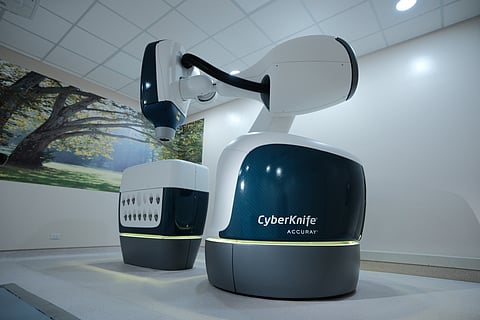
- NEWS
- the EDIT
- COMMENTARY
- BUSINESS
- LIFE
- SHOW
- ACTION
- GLOBAL GOALS
- SNAPS
- DYARYO TIRADA
- MORE

It was reported that the Asian Hospital in Muntinlupa had acquired a P334-million Cyberknife system. It is the Philippines’ first advanced robotic AI-driven cancer treatment with sub-millimeter precision that spares healthy tissue.
The Cyberknife AI is supposed to track tumor movements in real time and adjust the radiation beam to safely hit the tumor while protecting healthy tissue. In the past, traditional radiotherapy took 28 to 29 visits over weeks. The Cyberknife cuts that to one to five sessions.
At the heart of CyberKnife’s breakthrough capabilities is its ability to track tumors in real time. Most conventional radiation therapy systems rely on static imaging, which means they can’t adapt to changes in a tumor’s position during treatment — especially problematic in areas like the lungs, where tumors move as the patient breathes.
“It’s a radiation therapy machine designed to treat tumors at a higher dose with utmost precision,” said Dr. Michael Martin Malabanan, Radiation Oncologist, Asian Cancer Institute, Asian Hospital and Medical Center. “Precison is guided by fiducial markers and real time image tracking. It’s precise because of the added real tracking system not found in conventional radiotherapy machines.”
He added, “Success in radiation therapy depends on the tumor characteristics, it’s not a cure all treat all machine. Best to consult radiation oncologists.”
Precise and real-time tumor tracking
“This is the only machine that offers real-time tumor tracking during treatment,” said Dr. Jaemelyn Fernandez-Ramos, Cyberknife expert at Asian Hospital’s Asian Cancer Institute. “It’s the highlight of this system — unlike traditional linear accelerators that take static images before treatment, CyberKnife S7 continues to monitor and follow the tumor during every second of radiation delivery.
“And with the images taken during the treatment, there’s less damage to the healthy tissues around the cancer lesion,” Dr. Fernandez-Ramos added, noting that patients do not need to wear a harness and are allowed to breathe freely during the procedure.
CyberKnife S7 can safely deliver higher doses of radiation per session. That can mean fewer sessions overall and significantly shorter treatment times. Depending on the patient’s treatment plan, CyberKnife sessions can reduce lung cancer treatments from 30 sessions to just three; prostate cancer treatments from 42 sessions to only five and brain tumor treatments to as little as one session.
This not only minimizes the inconvenience and physical toll of daily hospital visits but also helps reduce the backlog of cancer patients awaiting treatment — especially important in a country like the Philippines, where cancer care resources remain limited.
Painless procedure
CyberKnife S7 is completely non-invasive, making it ideal even for patients who are not eligible for surgery, such as senior citizens with significant co-morbidities. It reduces exposure to healthy tissue, minimizes side effects, and improves overall comfort. With no incisions, nil anesthesia, and low recovery time, patients can return to their daily lives more quickly — and with better outcomes.
The machine is also pediatric-friendly, designed to treat children with minimal discomfort and maximum precision.
For information, email aci@asianhospital.com. Follow Asian Hospital social media pages for up-to-date information at https://www.asianhospital.com/.
